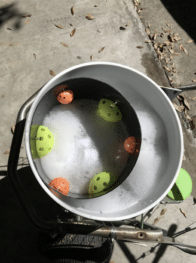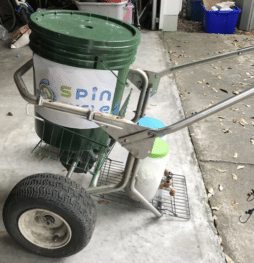NEWS
Davidson College Student’s Invention Could Improve Millions of Lives

Talar Terzian ’23
AUTHOR – Jen McGivney
An invention that began as a middle school science fair project now holds a patent—as well as the potential to improve millions of lives.
The idea belongs to James B. Duke Scholar Talar Terzian ’23. When she was in middle school, Terzian and her mom found a 19th century laundry agitator in an antique store, and it sparked her curiosity. For a science fair project, she designed a laundry agitator and then tested it against its 200-year-old predecessor, which sent her to the national Broadcom MASTERS finals in Washington, D.C.
The project didn’t end when the science fair did. Terzian’s curiosity led her to design new iterations. The first looked like a funnel attached to a stick. The next one relied on a lever system. Then she designed a washer powered by a manual sewing machine foot pedal. Then, a seed spreader. All of her ideas were devoted to the concept of a creating an effective mobile washing machine that didn’t require electricity.

Talar Terzian’s patented Spin Cycle Mobile Washer doesn’t require electricity and costs less than $15 to build.
When she was 15, a new friendship gave purpose to the idea—and took this project from an engineering endeavor to a philanthropic one. She met Belinda during the New York Academy of Science’s Junior Academy Global Summit. Belinda lived in Tanzania.
“She told me all about how in her village, she didn’t have access to electricity. She was having to spend 11 hours a week on laundry, going to a river to wash her clothes on rocks, which was contaminating the water source,” Terzian said. “I mean, she was a student. She was my age, and she was spending time doing laundry when she could’ve been studying. I really pushed to develop this machine for people like her.”
Terzian’s invention now has a name, The Spin Cycle Mobile Washer, and a patent. It’s powered by the innards of a seed spreader that allows people to wash their clothes while pushing it from behind. When someone pushes the washer, a rotor then turns a bucket that’s inside of another bucket: a bigger, five-gallon one for the water and a smaller one for the clothes. Inside, halved Wiffle balls act as paddles to agitate the laundry. The result is hydrodynamic shear force that washes the clothes. Remove the water, and that same force acts as a clothes dryer.
To Terzian, this mobile washer is more than a washer. It can be a tool of social equity, allowing women like Belinda to spend less time washing clothes and more on other pursuits. It can be a tool to combat climate change, reducing reliance on electricity. And it’s a device to improve water purity, with a filter that keeps pollutants out of groundwater.
The physics and mathematics and mathematics double major wants to do more work like this, combining interests from different disciplines into practical solutions.
“Talar is super bright and super motivated. She’s a person who’s interested in so many things, and she’s trying to use them to make the world a better place,” said Professor Mario Belloni, Terzian’s physics advisor. “This is a great invention that obviously uses concepts from a wide range of fields. It’s especially impressive for someone so young to not only come up with an invention, but then to go through the entire process of submitting a patent. It’s remarkable.”
For many communities, water sources are usually far from their homes, and it typically falls to women and girls to spend much of their time and energy fetching water. In sub-Saharan Africa, women and girls spend 40 billion hours per year on water collection. – UN Water and WaterAid
The invention is already changing lives. Terzian has shared the plans for the mobile washer with Belinda, as well as an adaptation that would allow Belinda to power the washer with her bike. Instead of Belinda spending 11 hours washing her clothes each week, she will be able to wash them as she bikes to and from the market. Terzian has also shared the plans with a leadership academy in Singapore, which will then distribute those plans to people who need them in Indonesia and Cambodia.
“Davidson’s stated purpose is “to assist students in developing humane instincts and disciplined and creative minds for lives of leadership and service.” Talar’s invention hits on all of those areas and more,” Belloni said. “It’s such a unique blend of entrepreneurship and humane instincts to help others, as well as the physics and engineering behind putting that together.”
The invention also reflects her concern for a healthy environment. The washer not only reduces energy consumption and water pollution, but it’s made from repurposed or recycled items and costs less than $15 in parts.
The experience has also guided Terzian’s academic and professional ambitions.
“Designing and building something for others, especially internationally, has propelled my interest in potential internships abroad that will allow me to use math skills and data analytics, or possibly pursuing a master’s degree in engineering management or mathematics,” she said. “Reducing our consumption of electricity is very important to reduce the negative effects of climate change, and I’m just glad my project will be used to help fight climate change.”


